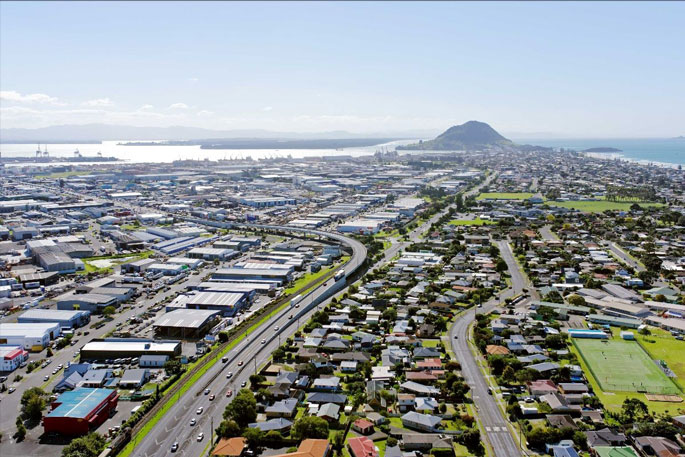Tauranga is playing catch up on its infrastructure, whilst grappling with rapid growth and suggested reforms could help fund what the city needs.
The Future for Local Government review panel released their final report on Tuesday after a two year study. It included 17 recommendations to produce better outcomes for local communities.
One of these centred on funding, and suggested the government paid rates on properties it owned, and that the portion of GST paid on annual rates be transferred back to councils.
It also suggested central government developed an intergenerational fund for climate change.
Tauranga City Council commission chair Anne Tolley said the recommendations around GST and the government paying councils rates would be a 'significant step in the right direction.”
'There's absolutely no doubt that the largely rates-based funding model does not work in fast-growth centres like Tauranga,” she said.
'In a wider infrastructure funding sense, we also need greater alignment between councils and government funding agencies to ensure that investment is available in the right timeframe for priority projects which will generate housing and economic benefits.”
Panel chair Jim Palmer said they would not comment on specific council's circumstances but agreed: 'Additional funding alone will not address all the issues facing local government.”
'The report identifies several opportunities to strengthen local democracy.
'We highlight the importance of lifting the capability of elected members and the executive staff as well.
'Increased investment is required to support and ensure elected members have the necessary skills and abilities to lead in challenging times and bring an intergenerational focus to decision making, said Palmer.
'We also believe that there needs to be more diversity in the makeup of councils helping ensure a broad range of perspectives are brought to the issues and opportunities facing local government.”
Touted as the most significant review of local government since the 1989 reforms and the 2002 Local Government Act, it also suggested 'reorganisation”.
This would mean amalgamating councils at regional level with two models suggested by the panel.
The unitary model would include regional council and local councils across an agreed sub-region.
A regional combined authority would have the councils remain, sharing functions and services.
.jpg) Tauranga City Council commission chair Anne Tolley said amalgamating council's "could offer some advantages". Photo: John Borren/SunLive.
Tauranga City Council commission chair Anne Tolley said amalgamating council's "could offer some advantages". Photo: John Borren/SunLive.
Asked her thoughts on a unitary model that would see Tauranga City, Western Bay of Plenty and the Bay of Plenty Regional Council combined, Tolley replied: 'A Western Bay unitary council model could offer some advantages and would eliminate confusion about which councils provide which services in which areas.
'This is not something that has been formally discussed, however, and would need to be considered at an inter-council level if the Government is keen to pursue this approach.
'Any changes would need to be on a case-by-case basis, with willing parties and with the full involvement of the communities concerned.”
The recommendations also included a four year electoral term and lowering the voting age to 16 for local government.
Also lowering the threshold for the establishment of Māori wards and enabling Te Tiriti-based appointments to councils.
As well as a statutory requirement for councils to develop partnership frameworks with hapū/iwi and Māori.
Palmer said: 'Advancing the recommendations is critical to making sure local government can deliver the services and infrastructure needed for healthy, thriving and resilient communities for years to come.”
But action on the report won't happen before this year's general election.
Minister for Local Government Kieran McAnulty told Local Democracy Reporting the independent report requested by the sector was an opportunity to work with local government and consider the issues raised, after the upcoming election.
"The recommendations are not government policy but will provide an opportunity to work with local government to agree on what changes need to be made to make it fit for purpose for 30-to-50 years," he said.
Panel member Brendan Boyle said the recommendations are 'changes that are needed for the future, irrespective of whom is in government today or tomorrow”.
Public Interest Journalism funded through NZ On Air




2 comments
Oh come on!
Posted on 23-06-2023 09:16 | By Shadow1
Tauranga is a good example of why Central Government shouldn’t try to change Local Government. It has been a disaster since the compulsory seismic strengthening directives destroyed the CBD. Government made Tauranga make more land available for developers to shaft home builders, and changed the rules on how many houses could be built on a section. This meant that stormwater, water and sewer systems were too small to carry the extra load. Then they accused Council of not spending enough on infrastructure, sacked our elected representatives and brought in the dictators. We all know the rest. Rates, which were already amongst the highest in NZ increased by more than 30%. The roads have become doubly congested since work started on our main arterial routes three years ago. What a joke. Shadow1.
Hmmm
Posted on 23-06-2023 13:29 | By Let's get real
Far too many areas of concern for me, particularly when electing people into council positions based solely on racial identity. I have made the same comments about every candidate for government highlighted here, that they are promoting their "likeablity" instead of their "electability". The current government is perfectly highlighting the importance of having capable and committed members of Parliament, who are CAPABLE of doing the job of a minister. "Incompetent" shouldn’t be leveled at a Parliamentarian or a Councillor, but it’s happening more and more often, because we’re electing NICE rather than CAPABLE. We have been paying commissioners vast amounts of money, which I suspect might entice some quality candidates to the GENERAL list of candidates for election into council offices and might result in some quality decision making.
Leave a Comment
You must be logged in to make a comment.